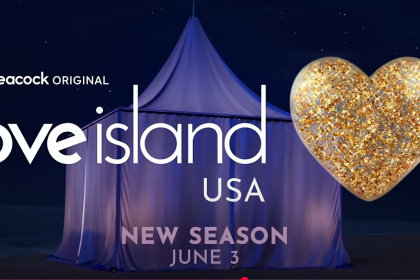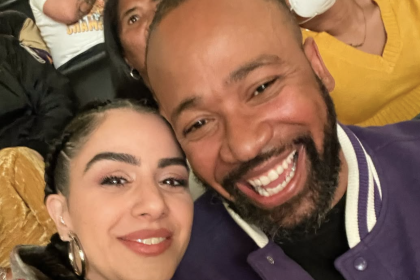Gbenga Akinnagbe has a long list of credits that command your attention. Not only is he an actor who has been making his mark since 2005, but he also writes freelance for the New York Times. He’s an avid runner who’s participated in the New York City Marathon to raise money for charity and he was a star wrestler in college. Born in Washington, D.C., Akinnagbe is of Nigerian descent.
Here, he discusses his first introduction to acting as a career option and why art is equivalent to laws.
Do you most often actively seek inspiration or does it find you? Or is there a combination of the two?
It’s about 80 percent me seeking it, 20 percent it finding me.
What led you to art in general and to your art form(s) in particular?
By chance. I used to work for the federal government and a colleague stopped by my cubicle and said an actress friend was in town. I’d never thought about acting as a career. I asked her some questions and it sparked my curiosity, I bought some books, researched it online, learned more about what actors did, and started going on auditions. Now, I think acting is one form or medium in which I express myself and my art. I’m fortunate enough to be able to utilize acting as another expression of self, and do that in other ways as well.
Have you and your artistry ever been involved in traditional business? If so, how?
I recently launched a clothing line called Liberated People at www.weareliberated.com. It’s a for profit company with a socially conscious core making eco-friendly revolutionary ware.
In addition to mastering their art, what other skill sets to you recommend that artists develop if they want to be successful?
Sometimes, it’s difficult for artists to appreciate other forms of art. It’s an important skill set to look outside of what your comfortable with, outside of the language you know, either a literal language or metaphorical, and you can find all kinds of inspiration. To be comfortable seeking the uncomfortable.
How do you stay at the leading edge of your craft?
That’s subject to discussion as to whether or not I do. I don’t know if it’s something I can ever know I accomplished. All I control is to make sure I’m on that path. Doing things like The Rainmaker at the Old Globe Theatre in San Diego and be fortunate enough to play the title character. It’s pushing the extent of my craft and pushing me to sharpen; doing eight shows a week doesn’t allow much room for bulls*** on stage at all. I seek difficult artistic opportunities where I have a great opportunity to fail, and I try to make sure I have the skills in the moment – whether I have them already or need to get them – in order to succeed.
Do you think that there are any widely held misconceptions about art and/or artists? If so, what are they and how do you work to dispel them?
Some misconceptions are [we’re] slackers or that artists are only consumed with themselves and not the world around them. I try to work very hard on a myriad of things for completion. I try to be on time which seems like a simple thing but you’d be surprised by how many people aren’t prompt or on time and how that’s widely accepted. I like to put at least 50 percent of my energy into activities in groups that have nothing to do with me, like non-profit work, protest and sit-ins and so on. If I could do more than 50 percent or achieve 50 percent; I’d consider myself ahead
How do you map out your goals? How do you measure your success?
I don’t know if I’m too good at mapping out my goals. I usually go from project to project without a huge plan, just judge it on it’s merit, if it will be good for my career or good for me artistically. How do I measure my success?
Well, I’m still here. This is a difficult thing we’ve chosen to do and I’ve seen very talented people fall off and not be able to continue in this field and I’m fortunate enough to consider myself among the successful by just being here and being able to choose projects that I want to do.
I remember a few years ago that I said I want to be able to when it comes to making movies to be able to turn down people’s money as far as producing a film because we have the resources we need. And this past year I did that for the first time, which was shocking to me and humbling and amazing to be in that position. And of course I went back and said let’s roll that money into this next project, which was great, so for me I felt like I achieved a small piece of success by being able to do that.
Who do you consider to be your peers in your field? Who do you see/use as examples for you to emulate?
I know the industry says my peers are everyone my age and race, pretty much everyone in Big Words. But my peers also include people who are not my race. I’ve been in on many projects that were exclusively looking for white actors and I was fortunate enough they thought outside the box and brought me in. Sort of like this play I’m doing now. Amongst my peers I have a very talented group of contemporaries. As far as who I emulate, I got a painfully large boy crush on Daniel Day-Lewis.
Name two of your top role models: one in the art world and one from outside of it.
Outside of the art world, I’d have to say Christopher Hitchens. I thought he was an amazing individual and did important work, pretty much all his life, towards speaking truth to power. It’s funny, my role models are so far ahead of me there’s no way I can really set myself on their track or model myself after. For example Prince. I gush when I talk about Prince, talk about a creature who’s purpose in life was to create art, he’s amazing. To me, Prince’s albums are like fine art that appreciates over time. It only gets better.
Name three books, works, performances or exhibits that changed how you view life and/or yourself.
Reading A Moveable Feast by Ernest Hemingway, seeing Fiona Shaw in Medea, and any Daniel-Day Lewis performance.
Why do you consider continued learning important?
If we’re not learning, we’re dying. There’s no other state to be.
What role does art have in the community? What role would you like to see art play in the community?
I believe art is a tool for a community to express itself and when it dies there is a build up. I think, of energies good and bad, and that reflects how necessary it is to have the facilities and resources to have art in community. To me, art is as important as laws in a community.
What software, app or other technological innovation has made the biggest difference in your life and/or career?
I’m on my Samsung phone day and night, just trying to keep the momentum going forward whether it’s acting, producing, it lets you reach people around the world which is immeasurable.
Please define your personal brand.
I don’t know, I’m not sure. Better answered by anyone reading this.
What is your favorite vacation destination and why?
I don’t vacation much.
If you could change one thing about the world, what would it be?
I’d like to take money out of politics.
If you could change one thing about yourself, what would it be?
I’d like to put that money from politics into my bank account. Really, I’d like to increase my ability to understand.
What does it take to be iconic? In your estimation, who has achieved that status?
Being true to one’s self and still being successful on personal artistic level, and in many ways on the commercial level. Like Prince, breaking boundaries, repeatedly.












